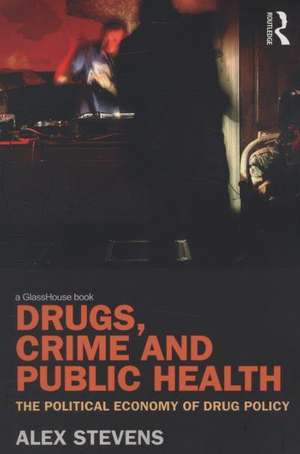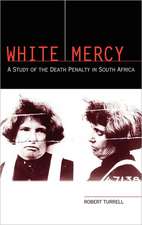Drugs, Crime and Public Health: The Political Economy of Drug Policy
Autor Alex Stevensen Limba Engleză Paperback – 14 mar 2011
| Toate formatele și edițiile | Preț | Express |
|---|---|---|
| Paperback (1) | 377.82 lei 43-57 zile | |
| Taylor & Francis – 14 mar 2011 | 377.82 lei 43-57 zile | |
| Hardback (1) | 1055.69 lei 43-57 zile | |
| Taylor & Francis – 10 sep 2010 | 1055.69 lei 43-57 zile |
Preț: 377.82 lei
Nou
Puncte Express: 567
Preț estimativ în valută:
72.30€ • 75.67$ • 60.17£
72.30€ • 75.67$ • 60.17£
Carte tipărită la comandă
Livrare economică 31 martie-14 aprilie
Preluare comenzi: 021 569.72.76
Specificații
ISBN-13: 9780415610674
ISBN-10: 0415610672
Pagini: 216
Ilustrații: charts
Dimensiuni: 156 x 234 x 13 mm
Greutate: 0.18 kg
Ediția:1
Editura: Taylor & Francis
Colecția Routledge-Cavendish
Locul publicării:Oxford, United Kingdom
ISBN-10: 0415610672
Pagini: 216
Ilustrații: charts
Dimensiuni: 156 x 234 x 13 mm
Greutate: 0.18 kg
Ediția:1
Editura: Taylor & Francis
Colecția Routledge-Cavendish
Locul publicării:Oxford, United Kingdom
Cuprins
1. Starting Points: Drugs, Values and Drug Policy 2. ‘Afflictions of Inequality’? The Social Distribution of Drug Use, Dependence and Related Harms 3. Beyond the Tripartite Framework: The Subterranean Structuration of the Drug-Crime Link 4. Telling Policy Stories: Governmental Use of Evidence and Policy on Drugs and Crime 5. The Ideology of Exclusion: Cases in English Drug Policy 6. The Effects of Drug Policy 7. International Perspectives: Does Drug Policy Matter? 8. Towards Progressive Decriminalisation
Recenzii
'penetrating and insightful... [Stevens] strikes exactly the right balance between accessibility and critical depth and has produced a book that will deservedly attract a wide readership.... I wish and hope that one or two presidents and prime ministers around the world end up reading a copy. Who knows what might happen then?' - Toby Seddon, British Journal of Criminology, Vol. 51 No. 4 (2011)
"Drugs, Crime and Public Health provides a powerful diagnosis of the drug problem and is a must-read for anybody seriously interested in the subject. The analysis is thoughtful and nuanced, yet refreshingly concise and clear-sighted. Rather than academic dissembling, the political implications are laid bare, though the call for 'more reliable evidence on which to build drug policy' is tinged with irony. Stevens' own analysis suggests the evidence he presents will be unplatable to those best placed to act on it and will almost certainly be subject to the processes of selectivity and silencing he describes. That said, the call for a progressive coalition has an air of realpolitik about it, encapsulating what might be taken as the book's core manifesto - drug policy is inevitably political, but is too important to be left to politicians and their advisors." - Michael Shiner, Druglink (September/October 2013)
'penetrating and insightful... [Stevens] strikes exactly the right balance between accessibility and critical depth and has produced a book that will deservedly attract a wide readership.... I wish and hope that one or two presidents and prime ministers around the world end up reading a copy. Who knows what might happen then?' - Toby Seddon, British Journal of Criminology, Vol. 51 No. 4 (2011)
'This is an interesting, relevant and wide-ranging book written with passion. The central question of this book is why the poor and socially deprived bear most of the harms related to the use of illegal drugs, when the use of such substances is found in all sectors of society? To explore this question, Alex Stevens situates drug policy within the political economy of the distribution of power and resources in society. By doing this, he distances himself from the more drug centered conceptions of drug policy that dominate both academic literature and policy making. This opens for interesting perspectives on the role and the relevance of drug policy in the distribution of drug related harm.' – Esben Houborg, Center for Alcohol and Drug Research, Aarhus University, Denmark
"Drugs, Crime and Public Health provides a powerful diagnosis of the drug problem and is a must-read for anybody seriously interested in the subject. The analysis is thoughtful and nuanced, yet refreshingly concise and clear-sighted. Rather than academic dissembling, the political implications are laid bare, though the call for 'more reliable evidence on which to build drug policy' is tinged with irony. Stevens' own analysis suggests the evidence he presents will be unplatable to those best placed to act on it and will almost certainly be subject to the processes of selectivity and silencing he describes. That said, the call for a progressive coalition has an air of realpolitik about it, encapsulating what might be taken as the book's core manifesto - drug policy is inevitably political, but is too important to be left to politicians and their advisors." - Michael Shiner, Druglink (September/October 2013)
"Drugs, Crime and Public Health provides a powerful diagnosis of the drug problem and is a must-read for anybody seriously interested in the subject. The analysis is thoughtful and nuanced, yet refreshingly concise and clear-sighted. Rather than academic dissembling, the political implications are laid bare, though the call for 'more reliable evidence on which to build drug policy' is tinged with irony. Stevens' own analysis suggests the evidence he presents will be unplatable to those best placed to act on it and will almost certainly be subject to the processes of selectivity and silencing he describes. That said, the call for a progressive coalition has an air of realpolitik about it, encapsulating what might be taken as the book's core manifesto - drug policy is inevitably political, but is too important to be left to politicians and their advisors." - Michael Shiner, Druglink (September/October 2013)
'penetrating and insightful... [Stevens] strikes exactly the right balance between accessibility and critical depth and has produced a book that will deservedly attract a wide readership.... I wish and hope that one or two presidents and prime ministers around the world end up reading a copy. Who knows what might happen then?' - Toby Seddon, British Journal of Criminology, Vol. 51 No. 4 (2011)
'This is an interesting, relevant and wide-ranging book written with passion. The central question of this book is why the poor and socially deprived bear most of the harms related to the use of illegal drugs, when the use of such substances is found in all sectors of society? To explore this question, Alex Stevens situates drug policy within the political economy of the distribution of power and resources in society. By doing this, he distances himself from the more drug centered conceptions of drug policy that dominate both academic literature and policy making. This opens for interesting perspectives on the role and the relevance of drug policy in the distribution of drug related harm.' – Esben Houborg, Center for Alcohol and Drug Research, Aarhus University, Denmark
"Drugs, Crime and Public Health provides a powerful diagnosis of the drug problem and is a must-read for anybody seriously interested in the subject. The analysis is thoughtful and nuanced, yet refreshingly concise and clear-sighted. Rather than academic dissembling, the political implications are laid bare, though the call for 'more reliable evidence on which to build drug policy' is tinged with irony. Stevens' own analysis suggests the evidence he presents will be unplatable to those best placed to act on it and will almost certainly be subject to the processes of selectivity and silencing he describes. That said, the call for a progressive coalition has an air of realpolitik about it, encapsulating what might be taken as the book's core manifesto - drug policy is inevitably political, but is too important to be left to politicians and their advisors." - Michael Shiner, Druglink (September/October 2013)
Descriere
Drugs, Crime and Public Health provides an accessible but critical discussion of recent policy on illicit drugs. Using a comparative approach – centred on the UK, but with insights and complementary data gathered from the USA and other countries – it argues that problematic drug use can only be understood in the social context in which it takes place.

















